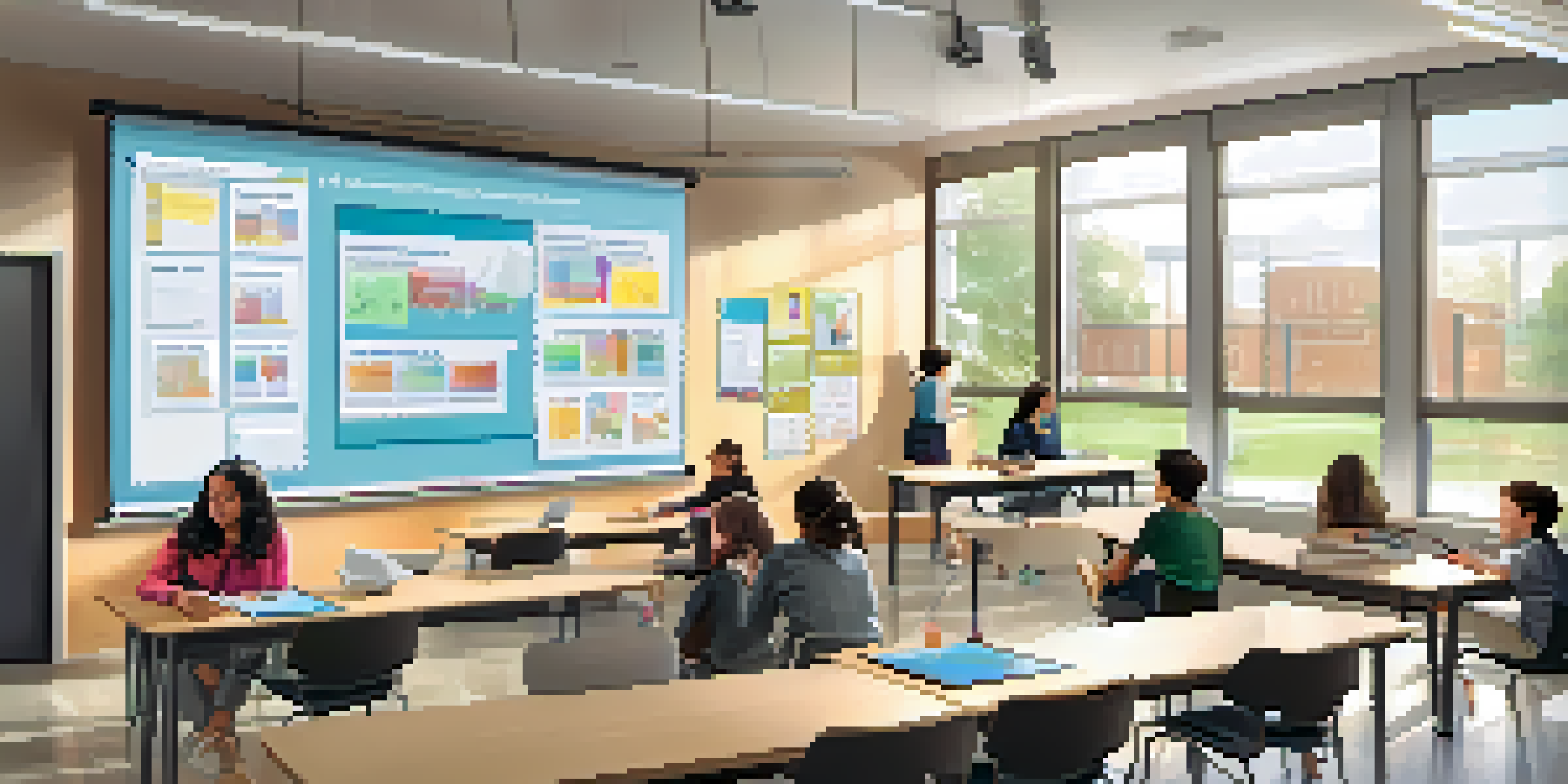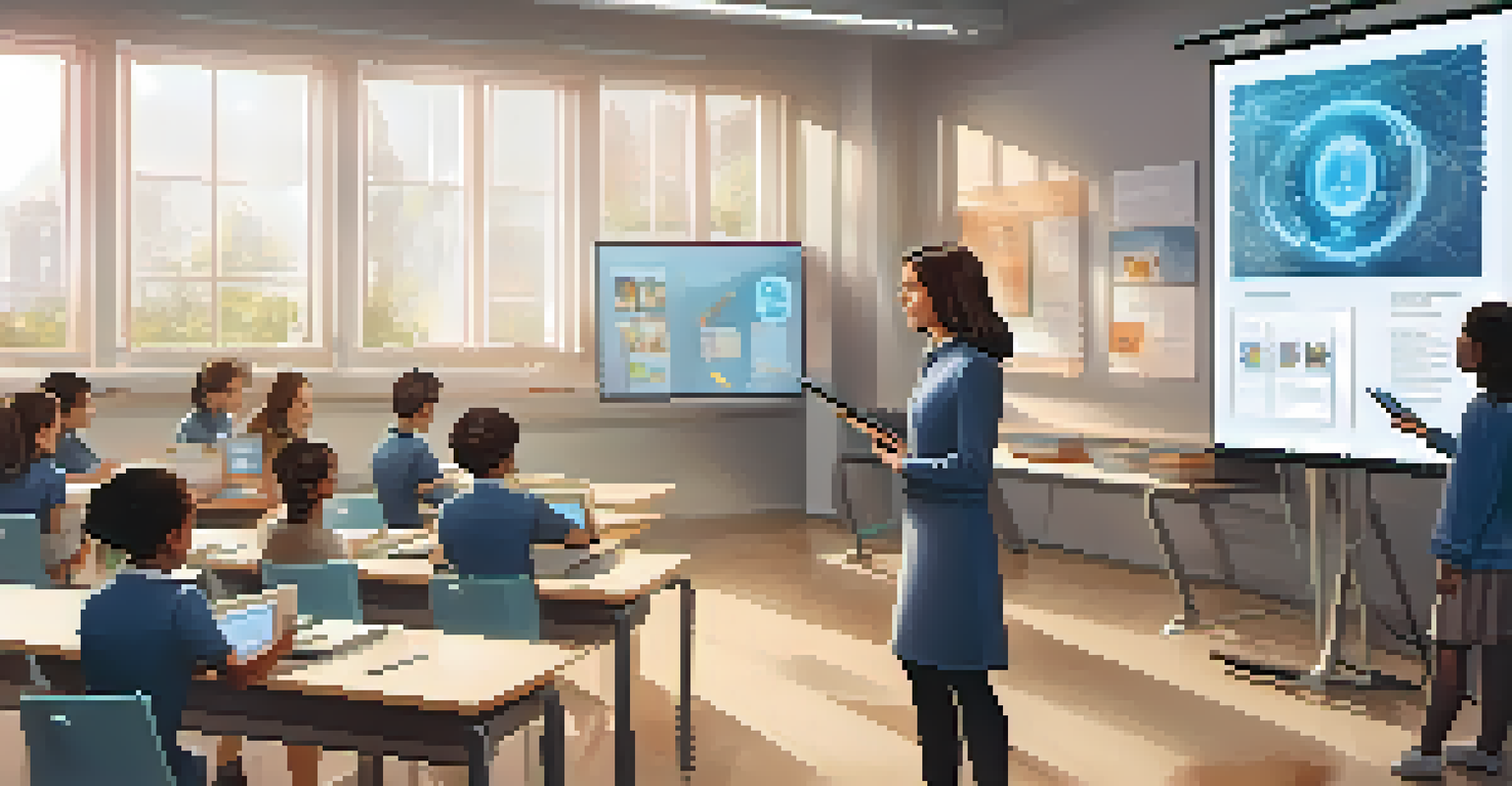The Role of Technology in Shaping Future Work Education

Understanding Technology's Impact on Education
Technology is revolutionizing how we approach education, making learning more accessible and engaging. With the rise of online courses and educational platforms, students can now access a wealth of information from anywhere in the world. This shift allows for personalized learning experiences that cater to individual needs and paces, making education more inclusive.
Technology will not replace teachers, but teachers who use technology will replace those who do not.
Moreover, technology facilitates collaboration among students and educators, breaking down geographical barriers. For instance, virtual classrooms enable students from different parts of the globe to work together on projects, fostering a sense of community. This collaborative spirit not only enhances learning but also prepares students for diverse work environments.
As we delve into the future of work, understanding these technological impacts on education becomes crucial. Preparing learners for the evolving job market means embracing technology as a core component of their education, ensuring they are equipped with the skills needed for success.
The Rise of Online Learning Platforms
Online learning platforms have surged in popularity, reshaping how education is delivered. Websites like Coursera and Udemy offer courses from top universities and industry experts, allowing learners to gain skills at their own pace. This flexibility is particularly appealing for working professionals seeking to upskill without disrupting their careers.

Additionally, these platforms often provide micro-credentials, which are shorter courses that focus on specific skills. This approach allows learners to quickly adapt to changes in their fields, making them more competitive in the job market. For example, someone in marketing can take a short course on digital analytics, immediately applying that knowledge to their current role.
Tech Enhances Accessible Learning
Technology is making education more accessible and personalized, allowing students to learn at their own pace from anywhere.
The shift towards online learning also highlights the importance of self-directed learning. As learners take charge of their education, they develop critical skills such as time management and self-motivation, which are essential in the modern workplace.
Blended Learning: Combining Online and In-Person Techniques
Blended learning merges traditional classroom methods with online activities, creating a hybrid educational experience. This approach allows educators to leverage the best of both worlds, utilizing technology for interactive content while maintaining face-to-face engagement. For instance, teachers can assign videos and online quizzes outside of class to maximize in-person time for discussion and hands-on activities.
The future of education is not just about technology; it's about creating a culture of continuous learning and adaptation.
This model not only enhances understanding but also caters to various learning styles. Visual learners might thrive on video content, while kinesthetic learners benefit from hands-on experiences. By offering a variety of learning modalities, blended learning ensures that all students can engage in ways that suit them best.
Furthermore, blended learning prepares students for the future workplace, where remote and in-person work often coexist. Familiarity with both online tools and classroom dynamics equips students with the adaptability needed in today's fast-paced job environment.
The Role of Artificial Intelligence in Education
Artificial Intelligence (AI) is playing an increasingly significant role in shaping educational experiences. From personalized learning algorithms that adapt to student performance to AI-driven tutoring systems, technology is enhancing how students learn. For example, AI can identify a student's strengths and weaknesses, tailoring resources accordingly to optimize their learning journey.
Moreover, AI tools can automate administrative tasks for educators, freeing them to focus on teaching. Grading assignments and managing schedules can be time-consuming, but AI can streamline these processes, allowing teachers to spend more time engaging with their students. This shift not only improves efficiency but also enhances the overall educational experience.
AI Transforms Educational Experiences
Artificial Intelligence is improving learning by personalizing education and automating administrative tasks for educators.
As AI continues to evolve, it’s crucial for educational institutions to embrace these technologies. Understanding and integrating AI systems prepares students for a workforce where automation and intelligent systems are becoming the norm.
Preparing Students for a Tech-Driven Job Market
As technology reshapes industries, preparing students for a tech-driven job market is essential. Educational institutions must prioritize teaching skills that are relevant to the modern workforce, such as coding, data analysis, and digital literacy. For instance, incorporating technology-focused curricula helps students gain a competitive edge in their future careers.
Additionally, internships and hands-on projects that utilize technology can provide invaluable real-world experience. Students who engage in these opportunities often find themselves better prepared to tackle challenges in their fields. A marketing student who has managed social media campaigns using analytics tools, for example, will likely stand out to potential employers.
In essence, aligning educational goals with industry demands ensures that students are not just learning but are also equipped to thrive in their chosen careers.
The Importance of Lifelong Learning in the Tech Era
In today's fast-paced world, the concept of lifelong learning has become more important than ever. With technology constantly evolving, professionals must continuously update their skills to remain relevant. This mindset encourages individuals to seek out new knowledge and skills throughout their careers, fostering adaptability in a changing job landscape.
Many organizations now emphasize continuous education as part of their culture, providing training and development opportunities for their employees. For instance, companies might offer workshops or support for online courses, demonstrating their commitment to employee growth. This investment not only benefits the employees but also contributes to the organization’s overall success.
Lifelong Learning is Essential
In a rapidly evolving job market, continuous education is vital for individuals to stay relevant and adaptable.
Ultimately, embracing lifelong learning empowers individuals to take charge of their personal and professional development, ensuring they can navigate the challenges of an increasingly technology-driven world.
The Future of Work Education: Challenges and Opportunities
As we look towards the future of work education, several challenges and opportunities emerge. One significant challenge is ensuring equitable access to technology and educational resources. While many students benefit from online learning, others may face barriers such as lack of internet access or digital literacy. Addressing these disparities is crucial for creating a fair educational landscape.
On the flip side, the rise of technology also opens up new opportunities for innovation in education. Virtual reality, for instance, can create immersive learning experiences that transport students to different environments, enhancing their understanding of complex concepts. This innovative approach not only captivates students but also fosters deeper learning.

Navigating these challenges and opportunities requires collaboration among educators, policymakers, and technology developers. By working together, we can harness the potential of technology to create an educational system that prepares students for the future of work.